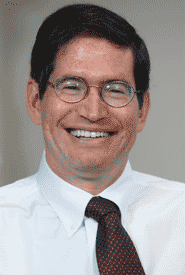Harvard Law School Professor Michael Klarman gave a talk discussing “Racial Equality in American History” to mark his appointment as the Kirkland & Ellis Professor of Law. The wide-ranging talk, given on April 12, touched upon civil rights history, legal history, and cultural history in order to uncover, as Klarman said, “the racial attitudes and practices in American history, and how and why they change over time.”
Based largely on research the constitutional scholar did for his 2007 book, “Unfinished Business: Racial Equality in American History,” Klarman listed seven observations about race in American history:
- Racial progress in American history has not been inevitable. The standard narrative of constant racial progress is misleading, Klarman said. There have been periods of both racial regression and progress.
- Racial progress has not been a result of whites ‘seeing the light’ and ‘doing the right thing.’ There is a conventional view that Americans simply harkened back to the Declaration of Independence – that there is universal equality. That view is misleading: African Americans had to fight for the change they accomplished.
- “African Americans demanding their rights has never been sufficient; it is also necessary that conditions be right,” Klarman said. He gave several examples, including urbanization and the “great migration,” when five million African Americans moved from the south to the north in the early 20th century. “It is almost impossible to reform a nearly totalitarian system like white supremacy entirely from within,” Klarman added. “The system is self-sustaining: African Americans can’t vote, so they can’t change the system through politics.”
- Racial progress has often been an unintended consequence of actions that were undertaken for other reasons. For example, the Civil War was started in order to keep the country together, Klarman said.
- Whites have often had ulterior motives for taking racially progressive positions. For example, the State Department wrote a brief to the Supreme Court in Brown v. Board of Education urging the Court to make the racially progressive decision in favor of school desegregation because racial inequality was grist for the Communist propaganda mill.
- The Court has not reliably been on the racially progressive side of race issues.
- Whether the Court has been on the wrong side or the right side [of racial progress], it has tended to reflect the views of society rather than shaping them. In short, “The Supreme Court mirrors society at least as much as it shapes it,” said Klarman in closing.
In her introduction of Klarman, Dean Martha Minow praised his work for “bring[ing] meticulous but also sweeping attention to the underlying causes and effects of constitutional law. He enables extraordinary understanding of constitutional developments, including the psychological, the social, and the political contexts, and effects.”
Klarman joined the Harvard Law School faculty in 2008. An expert in constitutional law and history with a particular focus on race, he currently teaches criminal law, constitutional law, constitutional theory, and constitutional history.
He is the author of “From Jim Crow to Civil Rights: The Supreme Court and the Struggle for Racial Equality,” which won the Bancroft Prize in 2005, widely considered to be the most prestigious award in American history writing. His most recent book is “Unfinished Business: Racial Equality in American History,” which was published in 2007.
Klarman’s scholarly work and teaching have garnered him several awards, including this year’s Sacks-Freund Award for Excellence in Teaching at HLS, the first Roger and Madeleine Traynor Faculty Achievement Award for Excellence in Legal Scholarship given by the University of Virginia Law School, the University of Virginia Harrison Achievement Award, the State Council of Higher Education Faculty Award, and the All-University Teaching Award, one of Virginia’s highest honors for excellence in teaching, research, and service. He was elected to the Academy of Arts and Sciences in October 2009.
Established in 1996 by the law firm of Kirkland & Ellis, Klarman’s chair was previously held by Professor David Wilkins. Beginning in 1987, the firm – including several HLS alumni – began contributing to a fund with the intention of endowing a professorship at HLS. When ultimately established, the Kirkland & Ellis Professorship was the first chair to be endowed by a law firm.
Donald Kempf ’65, a member of the firm’s management committee at the time of the establishment of the chair, said the firm decided to make the contribution – the largest in the firm’s history – because “We are grateful to Harvard Law School for what it provides to its students and to the legal community.”
In the 1960s the firm made a gift to name a seminar room in Holmes Hall, and in 2005, Langdell South was renamed the Kirkland & Ellis Hall in recognition of another gift.
